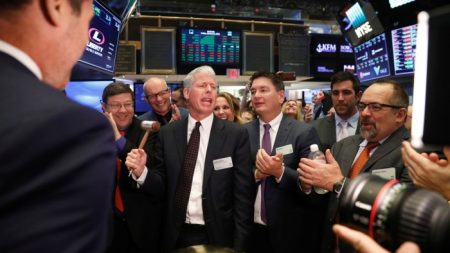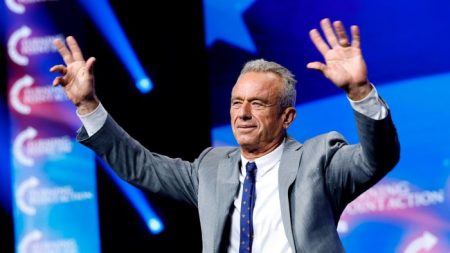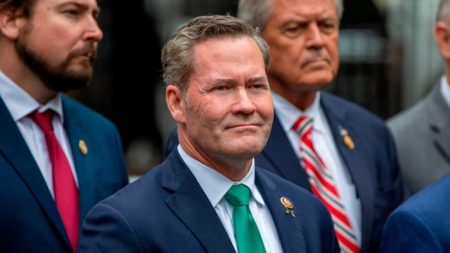A version of this story first appeared in CNN Business’ Before the Bell newsletter. Not a subscriber? You can sign up right here. You can listen to an audio version of the newsletter by clicking the same link.
After yet another remarkable jobs report on Friday that showed America’s labor market is firing on all cylinders, the runway for the Federal Reserve to land the economy’s figurative plane — gently — is now in clear view. But no matter how smooth the landing, there’s trouble at the destination.
The US economy is on the cusp of a “soft landing” — inflation slowing to the central bank’s 2% target in a sustainable manner without triggering major job losses.
But it also leaves Americans to deal with economic hurdles that intensified after inflation erupted in 2021. One of them is a housing market near its most unaffordable point in decades.
In a letter days before the Fed’s decision Wednesday to hold interest rates steady at a 23-year high, Democratic US senators blasted the central bank for America’s housing woes.
And even though the Fed’s decisions influence mortgage rates, the central bank’s two mandates are to stabilize prices and maximize employment, not ensure housing affordability, which is also hamstrung by limited housing supply.
In fact, measures Congress could pass to alleviate some pressure in the housing market, such as tax credits for first-time homebuyers or removing some government red tape, could be much more effective at addressing America’s affordability crisis, than the Fed simply lowering rates.
In 2021 when the Fed’s key interest rate was near zero, home-price growth soared at a historic double-digit pace, according to the S&P CoreLogic Case-Shiller National Home Price Index.
As it currently stands, housing is simply out of reach for many people, especially young Americans and those on the lower end of the income spectrum.
A soft landing would mean the labor market remains intact, and that interest rates may ease further, but the issue of insufficient housing supply varies by region and is often nuanced, based on local zoning laws and the presence (or absence ) of innovative policy approaches.
“The combination of higher incomes and slightly lower mortgage rates has already helped improve conditions, but affordability is likely to remain challenging for quite some time,” Orphe Divounguy, senior economist at Zillow, told CNN.
The average 30-year fixed mortgage rate reached 7.79% in late October, the highest level in more than two decades, according to Freddie Mac, but it’s gradually fallen since then, registering at 6.63% last week. That, in and of itself, has already improved sentiment among buyers and sellers, Fannie Mae surveys have shown. But that downward trend may not last.
Divounguy said that the average 30-year fixed mortgage rate will likely not fall below 6% this year.
Remember, home prices are also key, and they remain elevated nationwide, after exploding a few years ago. Data from the National Association of Realtors shows that the median home sale price in 2023 was $389,800, up about 1% from 2022 and the highest on record. Home prices may not budge in the short term, according to economists.
“When mortgage rates fall, it’s hard to build new homes because the demand just drives up prices, because with lower rates, people start to compete for the same number of homes and with multiple people competing, prices go up,” Daryl Fairweather, chief economist at Redfin, told CNN.
“The sustainable solution is to make it easier to build housing. That way we can actually start heading in the right direction with affordability and have that be sustainable and not just a short-term interest rate phenomenon,” she said.
Former President Donald Trump said that if he is reelected, he would not reappoint Federal Reserve Chair Jerome Powell, accusing Powell of considering rate cuts to give Democrats an advantage in the 2024 elections, my colleagues David Goldman and Alexandra Ross report.
“It looks to me like he’s trying to lower interest rates for the sake of maybe getting people elected, I don’t know,” Trump said in an interview with Fox Business Network’s Maria Bartiromo that aired Friday morning.
“I think he’s going to do something to probably help the Democrats, I think, if he lowers interest rates,” Trump said when asked if he believes the country will avoid a recession.
The former president said he has “a couple of choices” for the next Fed chair but declined to name them.
Powell reiterated Wednesday the Fed is considering rate cuts to bring rates down from multi-decade highs designed to combat high inflation. But he all but ruled out rate cuts in March, suggesting they may begin later this year. That decision to delay rate cuts was pretty much made for him Friday when the Bureau of Labor Statistics reported the US economy added a stunning 353,000 jobs in January.
Trump accused Powell of being “political,” adding to years of verbal attacks since Trump nominated him for Fed chair in 2017. Powell was reappointed by President Joe Biden in 2021. The Fed chair cannot be fired, but the president is responsible for nominating a candidate every four years for Congress’ approval.
Trump sparred with Powell almost immediately after he was appointed to the Fed, accusing Powell of hiking interest rates to harm the economy. The Fed, by its charter an apolitical, independent body, largely ignored Trump’s extraordinary attacks.
Powell during the Trump presidency avoided constant questions at news conferences about Trump’s latest tweets, but he continued to insist the Fed was focused exclusively on its dual mandate to improve job growth and keep inflation lower.
When Powell and the Fed sent rates to near zero in an extraordinary, emergency rate cut in the early days of the pandemic, Trump offered Powell rare praise.
Monday: Earnings from McDonald’s, Caterpillar, Estee Lauder and Tyson Foods. S&P Global and the Institute for Supply Management release January surveys gauging the US services sector. Atlanta Fed President Raphael Bostic delivers remarks.
Tuesday: Earnings from Eli Lilly, Toyota, UBS AG, Chipotle, Ford, Snap and CAVA. Cleveland Fed President Loretta Mester delivers remarks.
Wednesday: Earnings from Walt Disney, Uber, CVS, PayPal, Yum! Brands, Fox, The Carlyle Group, U-Haul, News Corporation, New York Times Company, Mattel and Spirit Airlines. The US Commerce Department reports exports and imports in December. Fed officials Adriana Kugler, Thomas Barkin and Michelle Bowman deliver remarks. China’s National Bureau of Statistics releases January inflation data.
Thursday: Earnings from S&P Global, ConocoPhillips, Unilever, Duke Energy, Pinterest, Expedia Group, Warner Music Group, Ralph Lauren, Tenet Healthcare, Under Armour and Yelp. Richmond Fed President Thomas Barkin delivers remarks.
Friday: Earnings from Pepsico and Honda.
Read the full article here















